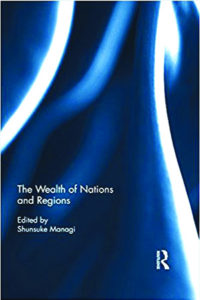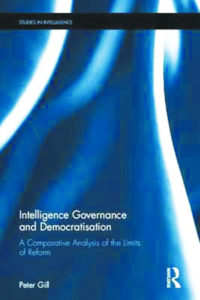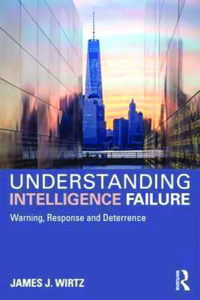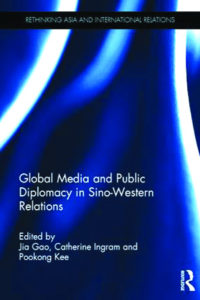
The Wealth of Nations and Regions
Edited by Shunsuke Managi
Routledge (2017)
Price: Rs17,836
There is an increasing interest in inclusive wealth, and inclusive wealth can be a solution to the problematic narrowness of the traditional national accounting sys-tem, which has been recognized for a long time. This book offers a comprehensive guide on this subject of inclusive wealth.
Shunsuke Managi is a distinguished professor at the School of Engineering, and director of Urban Institute at Kyushu University, Japan, while also holding positions as faculty fellow at The Research Institute of Economy, Trade and Industry and at QUT Business School and the University of Tokyo. He is an editor of Environmental Economic and Policy Studies, a lead author for the Intergovernmental Panel on Climate Change, the author of Technology, Natural Resources and Economic Growth: Improving the Environment for a Greener Future and editor of The Routledge Handbook of Environmental Economics in Asia.

Military Neuroscience and the Coming Age of Neurowarfare
Armin Krishnan
Routledge (2017)
Price: Rs16,137
Krishnan describes military applications of neuroscience research and emerging neurotechnology with relevance to the conduct of armed conflict and law enforcement. This work builds upon literature by scholars such as Moreno and Giordano and fills an existing gap, not only in terms of reviewing available and future neurotechnologies and relevant applications, but by discussing how the military pursuit of these technologies fits into the overall strategic context. The first to sketch future neurowarfare by looking at its potentials as well as its inherent limitations, this book’s main theme is how military neuroscience will enhance and possibly transform both classical psychological operations and cyber warfare. Its core argument is that nonlethal strategies and tactics could become central to warfare in the first half of the twenty-first century. This creates both humanitarian opportunities in making war less bloody and burdensome as well as some unprecedented threats and dangers in terms of preserving freedom of thought and will in a coming age where minds can be manipulated with great precision
Armin Krishnan is the author of Killer Robots: Legality and Ethicalilty of Autonmous Weapons.

Intelligence Governance and Democratisation
A Comparative Analysis of the Limits of Reform
Peter Gill
Routledge (2016)
PRICE: Rs15,288
Within the field of Security Sector Reform (SSR), academics have paid significant attention to both the police and military. The democratisation of intelligence structures that are at the very heart of authoritarian regimes, however, have been relatively ignored. The central aim of this book is to develop a conceptual framework for the specific analytical challenges posed by intelligence as a field of governance. Using examples from Latin America and Europe, it examines the impact of democracy promotion and how the economy, civil society, rule of law, crime, corruption and mass media affect the success or otherwise of achieving democratic control and oversight of intelligence. The volume draws on two main intellectual and political themes: intelligence studies, which is now developing rapidly from its original base in North America and UK; and democratisation studies of the changes taking place in former authoritarian regimes since the mid-1980s including security sector reform. The author concludes that, despite the limited success of democratisation, the dangers inherent in unchecked networks of state, corporate and para-state intelligence organisations demand that academic and policy research continue to meet the challenge.
This book will be of much interest to students of intelligence studies, democracy studies, war and conflict studies, comparative politics and IR in general.
Peter Gill is Honorary Senior Research Fellow at the University of Liverpool, UK. He is the author of Policing Politics (1994), Rounding Up the Usual Suspects (2000) and co-author of Intelligence in an Insecure World (2012).

Understanding Intelligence Failure: Warning, Response and Deterrence
James J. Wirtz
Routledge (2017)
Price: Rs17,836
This collection, comprising key works by James J. Wirtz, explains how different threat perceptions can lead to strategic surprise attack, intelligence failure and the failure of deterrence.
This volume adopts a strategist’s view of the issue of surprise and intelligence failure by placing these phenomena in the context of conflict between strong and weak actors in world affairs. A two-level theory explains the incentives and perceptions of both parties when significant imbalances of military power exist between potential combatants, and how this situation sets the stage for strategic surprise and intelligence failure to occur. The volume illustrates this theory by applying it to the Kargil Crisis, attacks launched by non-state actors, and by offering a comparison of Pearl Harbor and the September 11, 2001 attacks. It explores the phenomenon of deterrence failure; specifically, how weaker parties in an enduring or nascent conflict come to believe that deterrent threats posed by militarily stronger antagonists will be undermined by various constraints, increasing the attractiveness of utilising surprise attack to achieve their objectives. This work also offers strategies that could mitigate the occurrence of intelligence failure, strategic surprise and the failure of deterrence. This book will be of much interest to students of intelligence studies, strategic studies, security studies and IR in general.
James J. Wirtz is professor and dean of the School of International Graduate Studies at the Naval Postgraduate School Monterey, California, and editor of numerous books, including, most recently, Intelligence: The Secret World of Spies.

Global Media and Public Diplomacy in Sino-Western Relations
Edited by Jia Gao, Catherine Ingram, Pookong Kee
Routledge (2017)
Price: Rs15,288
Many researchers and China observers would agree that understanding how China pursues global communication is critical for assessing its growing soft power. While soft power as a concept has, in many ways, become almost inextricably linked with the PRC’s (People’s Republic of China) international diplomacy of the twenty-first century, the specific role of global media within soft power diplomacy and the corresponding influence of Western mediated public diplomacy within China is a lacuna that has remained largely unexplored. Moreover, the different Chinese and Western perspectives on the influence of global media and public diplomacy on Sino-Western relations, and the changing role of global media on this crucial aspect of international politics, have not yet been critically examined.
This volume presents a broad social science audience with recent innovative scholarship and research findings on global media and public diplomacy concerning Sino-Western relations. It focuses on the implicit nexus between global media and public diplomacy, and their actual utilisation in and impact on the shifting relationships between China and the West. Special attention is given to the changing nature of globalised media in both China and Western nations, and how globalised media is influencing, shaping and changing international politics. The contributions delve deeply into both theory and practice, and focus especially upon the analysis of several key aspects of the issue from both Chinese and Western perspectives.
This combination of approaches distinguishes the volume from most other published works on the topic, and greatly enriches our knowledge base in this important contemporary field.
Jia Gao is an associate professor of the Asia Institute, and concurrently assistant dean at the Faculty of Arts at the University of Melbourne, Australia.
Catherine Ingram is a postdoctoral fellow at the University of Sydney, Australia.
Pookong Kee is a professor and director of the Asia Institute at the University of Melbourne, Australia.

